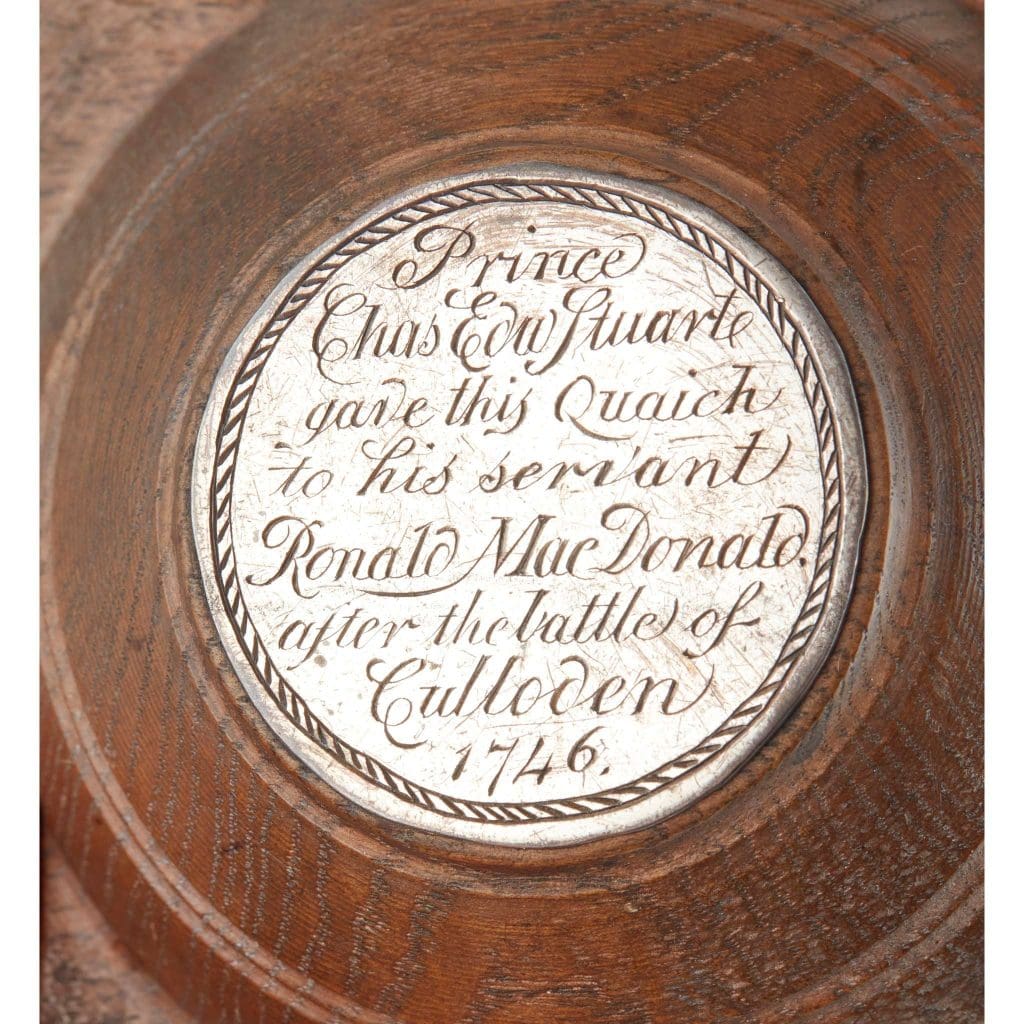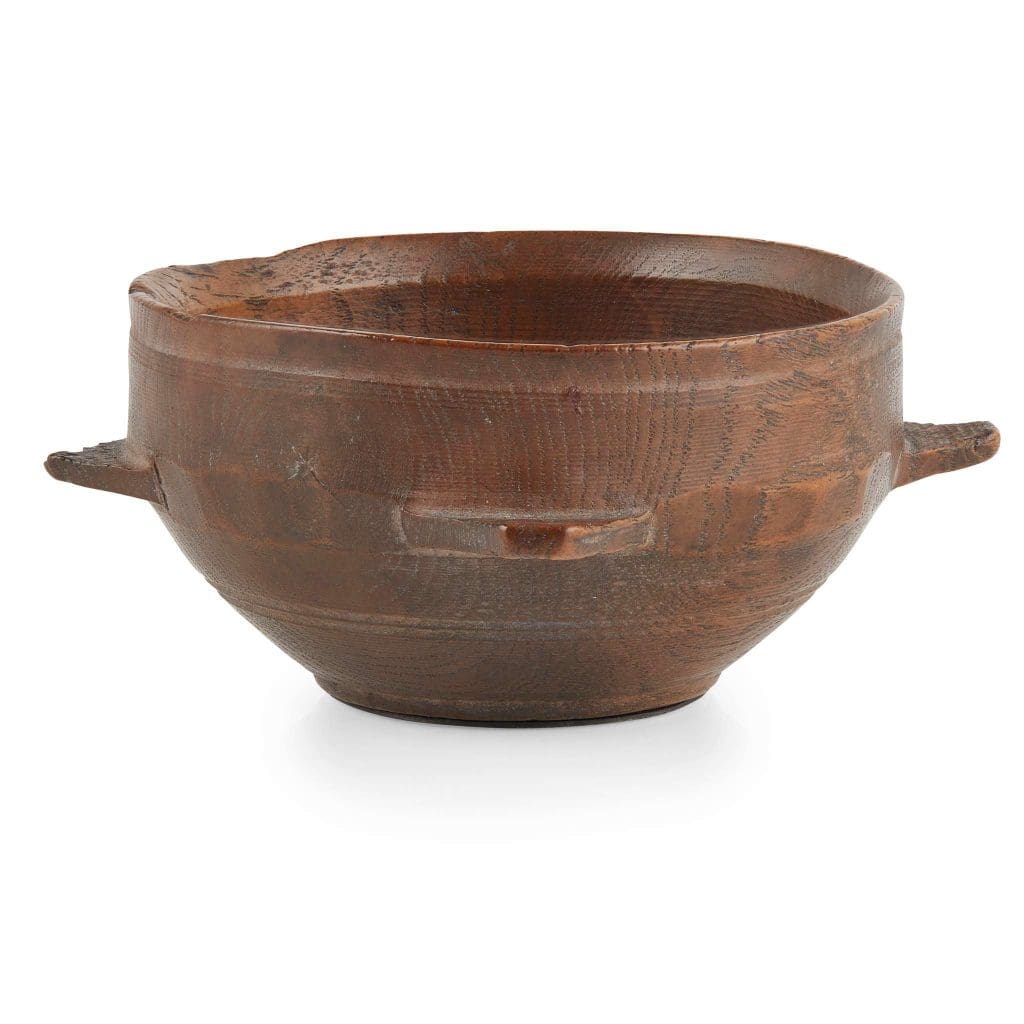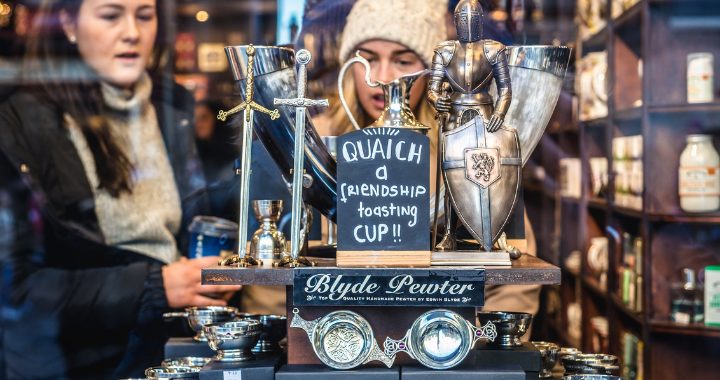As the end of November draws closer we look forward to St Andrews Day in Scotland. All across the world those with Scottish heritage celebrate the life of the patron saint, St Andrew. A celebration steeped in history, it is common belief that Andrew became the patron saint in 1320, following the declaration of Scottish independence.
St Andrew was known for his generosity, which is reflected today in the warmth and kindness of the Scottish people. How better to celebrate this occasion every year than with an often raucous celebration with music, food and of course a wee dram!


An 18th century wooden Quaich with applied silver plaque of Culloden interest. Sold for £7,560, Lyon & Turnbull, Edinburgh, 16 August 2023.
Traditionally whisky would have been taken from the quaich and passed round person to person. Deriving from the Gaelic word Cuach ; cup, this shallow two-lugged bowl originated in the Highlands. Brought out at gatherings, opposing clans would pass the quaich around to inspire trust and toast the beginning of new friendships.
The quaichs of the 16th century were formed of sections of wood, often in sycamore or yew. These staves were bound together with willow (withies) the woods often alternating, sometimes to include laburnum. Due to this method of construction, along with age and use, these rare, early quaichs are usually subject to some damage.
As the years progressed silversmiths began to add silver mounts and handles to these wooden forms perhaps for practical reasons for strength, then as time passed as a show of wealth. The 17th century saw the appearance of quaichs in silver. Harking back to the past, these beautiful examples of craftsmanship were often engraved to simulate the form of the original on which they were based. They can be found chased with vertical lines to imitate the staves and horizontal lines for the bindings. Some finer examples depicted flowerheads, stylised foliage and at times betrothal initials to the lugs.


Two handled silver Quaich by David Mitchell, Edinburgh, 1737 – 1738, inscribed ‘AS 1737 MW’ National Museum of Scotland.
It is documented that in the 19th century Sir Walter Scott offered his guests drams in silver quaichs at many of his gatherings. One of the more important quaichs in his collection was the Waterloo Tree Quaich. Constructed in part from wood that had allegedly been taken from the Waterloo Elm, when he visited the battlefield following The Battle of Waterloo. As for personal favourites his most beloved quaich was said to be an example made of seven bands of wood, which is believed to have been in the possession of Bonnie Prince Charlie when he made the gruelling journey from Edinburgh to Derby in 1745.
Contemporary quaichs, often embellished with Celtic knotwork and mythical beasts are still a popular gift to commemorate important occasions in Scotland, indeed following the 2014 Commonwealth Games in Glasgow, a wooden quaich was awarded to each winner.
To this day the quaich holds a special meaning to Scots – as a connection to their ancestors, and a link to their homeland.
Undoubtedly this fascinating vessel will always be remembered for its original purpose as a Highlander’s welcome, a cup to be shared by clan chiefs and crofters alike. The iconic quaich lives on, reminding us of the importance of hospitality, love and friendship.. Sláinte!
Please do contact us should you require an updated valuation of your silver collection.

A contemporary silver Quaich, with stylised thistle detail to lugs. From a selection available at Hamilton & Inches, 87 George Street Edinburgh, £795.
Please do contact us should you require an updated valuation of your silver collection by calling us on 01883 722736 or email [email protected].
Fiona moved south from the Highlands of Scotland in 1996 to study for the Christie’s Postgraduate Diploma in Decorative Arts at Glasgow University. A move to Edinburgh followed where she was delighted to be offered a position within the Silver and Jewellery department of Bonhams Edinburgh, where she remained for 23 years.
- Fiona Hamilton#molongui-disabled-link
- Fiona Hamilton#molongui-disabled-link
- Fiona Hamilton#molongui-disabled-link
- Fiona Hamilton#molongui-disabled-link







